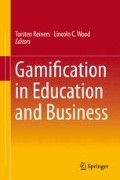Abstract
Games require rules, without rules there would not be any Gameplay (Kapp 2012: 29). Games are defined by the Game Design, which lays out the path: players may be able to choose a path on their own, or they may be bound to a certain route. Whether these rules (Salen & Zimmermann. Rules of play: Game design fundamentals. Cambridge, MA: MIT Press; 2003: 259) describe how a game is played (“Operational Rules”), are underlying formal structures which dictate game functionality (“Constitutional Rules”) or govern the social interaction between players (“Implicit Rules”), they are mandatory to keep the game system alive. In a game, a Game Master has to ensure these rules are followed (and everyone who has ever played Scrabble knows how hard this is), while in real life this responsibility is carried out by law enforcement authorities, courts and lawyers. This chapter will describe the legal implications involved, so stakeholders can avoid common risks and are also able to communicate to legal counsels efficiently.
Access this chapter
Tax calculation will be finalised at checkout
Purchases are for personal use only
Notes
- 1.
- 2.
for a Translation, with Interpretive Essay see Bartlett et al. 2011.
- 3.
- 4.
- 5.
- 6.
- 7.
- 8.
- 9.
Hackbart v. Cincinnati Bengals, Inc., 601F.2d 516 (10th Cir. 1979).
- 10.
Urt. v. 22.10.2012, Az. I-6 U 241/11 (Judgement).
- 11.
- 12.
- 13.
Bragg v. Linden Research, Inc., 487 F.Supp.2d 593 (E.D. Pa. 2007).
- 14.
e.g. § 305 German BGB (Civil Law Code), § 6 Austrian KSchG (Consumer Protection Law),
- 15.
LG Bielefeld (Regional Court), 30.10.1991 - 1S 174/90.
- 16.
- 17.
- 18.
- 19.
- 20.
for more details see “Copyright”.
- 21.
- 22.
- 23.
- 24.
Electronic Arts shut down service of “The Sims Online” in August 1, 2008 (http://news.cnet.com/8301-17938_105-9931757-1.html).
- 25.
- 26.
Baker v. Selden, 101 U.S. 99 (1879).
- 27.
see also Harris, The Legal Protection of Ideas, http://www.copyrightlaws.com/wp-content/uploads/2010/04/Protecting-Ideas1.pdf.
- 28.
PUBLIC LAW 105–304—OCT. 28, 1998 (retrievable under: http://www.gpo.gov/fdsys/pkg/PLAW-105publ304/pdf/PLAW-105publ304.pdf).
- 29.
ABl. EG Nr. L 167/10,22.06.2001.
- 30.
- 31.
17 U.S.C. § 107.
- 32.
Sony Corp. of America v. Universal City Studios, Inc., 464 U.S. 417 (1984).
- 33.
http://news.bbc.co.uk/2/hi/entertainment/3753001.stm or see what happened with the game “Uru” in Pearce, Communities of Play 174.
- 34.
Wu, Virtual Goods: the next big business model, http://techcrunch.com/2007/06/20/virtual-goods-thenext-big-business-model.
- 35.
- 36.
Gatto/Leavitt/Duranske, Copyright Registration for Virtual Goods: The Benefits of Timely Filing (http://www.pillsburylaw.com/siteFiles/Publications/29FA2776F2E9C643EC6CDCF8462D7FD4.pdf).
- 37.
Lex Julia de Annona.
- 38.
OLG Frankfurt GRUR 1983, 757 “Donkey Kong Junior I”; OLG Frankfurt WRP 1984, 79 “Donkey Kong Junior.
- 39.
OLG Frankfurt GRUR 1983, 758.
- 40.
- 41.
(German) BGH, 17.7.2013 – I ZR 34/12.
- 42.
- 43.
References
Bartlett, R. C., & Collins, S. D. (2011). Nicomachean ethics. Chicago: University of Chicago Press.
Belkin, J., & Noveck, B. (2006). The state of play: Law, games, and virtual worlds. New York: New York University Press.
Castranova, E. (2001). Virtual worlds: A first-hand account of market and society on the Cyberian Frontier. CESIfo Working paper, 618, 10.
Castranova, E. (2006). The right to play. In J. Belkin & B. Noveck (Eds.), The state of play: Law, games, and virtual worlds. New York: New York University Press.
Doran, G. T. (1981). There’s a S.M.A.R.T. way to write management’s goals and objectives. Management Review, 70(11), 35–36 (AMA FORUM).
Erenli, K. (2009). Virtual persons + virtual goods = real problems in Daras. Petros; Mayora, Oscar UCMedia, 2009, 265–270.
Fairfield, J. (2005). Virtual property. Boston University Law Review, 85, 1047; Indiana Legal Studies Research Paper No. 35.
Huizinga, J. (1971). Homo ludens: A study of the play-element in culture. Boston: Beacon.
Kapp, K., (2012). The gamification of learning and instruction: Game-based methods and strategies for training and education
Klickermann, P. H. (2007). Virtuelle Welten ohne Rechtsansprüche? MMR, 766.
Koch, P., (2006). Die rechtliche Bewertung virtueller Gegenstände auf Online-Plattformen, JurPC Webdok 57/2006.
Lastowka, G. F., Hunter, D. (2003). The laws of the virtual worlds, Public Law and Legal Theory Research Paper Series 03-10 (2003) p. 57.
Lastowka, G. F., & Hunter, D. (2006). Virtual crime. In J. Belkin & B. Noveck (Eds.), The state of play: Law, games, and virtual worlds. New York: New York University Press.
Lober, A., & Weber, O. (2005). Money for nothing, Der Handel mit virtuellen Gegenständen und Charakteren. MMR, 653.
Merrill, T. (1998). Property and the right to exclude. Nebraska Law Review, 1998, 730–755.
Pearce, C. (2011). Communities of play: Emergent cultures in multiplayer games and virtual worlds. Cambridge, MA: MIT Press.
Salen, K., & Zimmermann, E. (2003). Rules of play: Game design fundamentals. Cambridge, MA: MIT Press.
Taylor, M. (2009). International competition law: A new dimension for the WTO? New York: Cambridge University Press.
Trzaskowski, J. (2011). User-generated marketing: Legal implications when word-of-mouth goes viral. International Journal of Law and Information Technology, 20, 1–33. http://dx.doi.org/10.1093/ijlit/ear012.
Zichermann, G., & Linder, J. (2013). The gamification revolution. Berkeley, CA: Mcgraw-Hill Professional.
Author information
Authors and Affiliations
Corresponding author
Editor information
Editors and Affiliations
Rights and permissions
Copyright information
© 2015 Springer International Publishing Switzerland
About this chapter
Cite this chapter
Erenli, K. (2015). Gamification and Law. In: Reiners, T., Wood, L. (eds) Gamification in Education and Business. Springer, Cham. https://doi.org/10.1007/978-3-319-10208-5_27
Download citation
DOI: https://doi.org/10.1007/978-3-319-10208-5_27
Published:
Publisher Name: Springer, Cham
Print ISBN: 978-3-319-10207-8
Online ISBN: 978-3-319-10208-5
eBook Packages: Business and EconomicsEconomics and Finance (R0)

